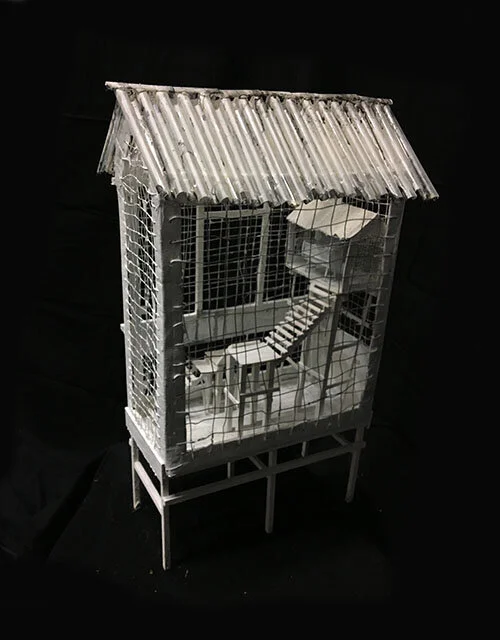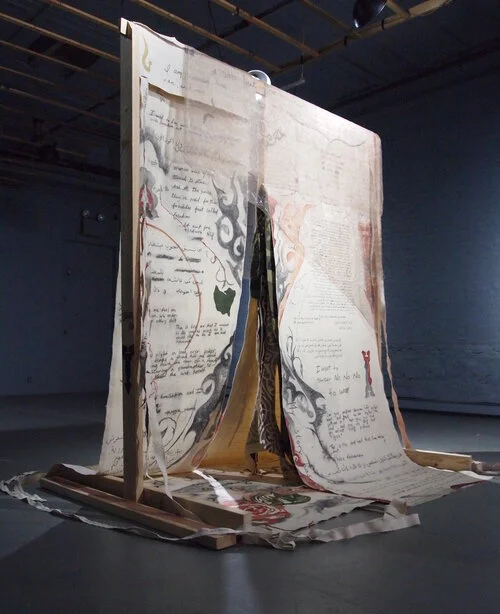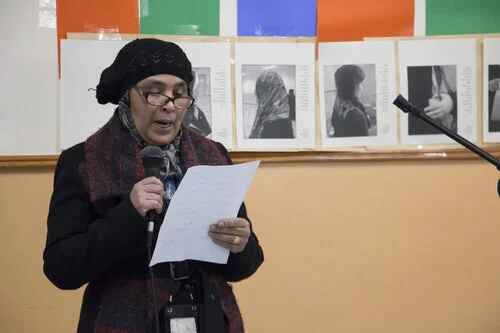Points of Vulnerability
Expect Some Discomfort
Empty Set Project Space
Curated by David Rios Ferreira
July 9 – July 30, 2020
Vulnerability is often misconstrued as weakness, as if it’s a cry for pity or inadvertently setting oneself up to be taken advantage of. I couldn’t disagree more. Vulnerability may compromise one’s privacy, but it is also rooted in the powers of self-advocacy, healing, and growth. The counter-behavior to vulnerability is repression, the aggressive act of slamming one’s internal doors shut and locking them, refusing to allow anyone in or out. These doors are wide open with David Rios Ferreira: in fact, he’s even added a welcome mat. The artist and curator has joined forces with Empty Set Project Space in the Bronx to present an immersive online exhibition, Expect Some Discomfort, featuring work by eight artists focusing on the varied and complicated expressions of human vulnerability. Artists Chloe Bass, Mitsuko Brooks, Dennis RedMoon Darkeem, Dominique Duroseau, Gina Goico, Néstor Pérez-Moliѐre, Katherine Toukhy, and Yeon Ji Yoo open their hearts to us in this sensitive and cathartic group exhibition.
Yeon Ji Yoo, Seeing Stars From The Chicken Coop At Night I, 2016, paper, wire, thread, wood, plastic, gesso, ink, 19 x 12 x 7 in. Image courtesy of the gallery.
Red Hook-based Korean artist Yeon Ji Yoo’s sculptural series Tell Me More is accompanied by strikingly personal, forthright text about the impact of generational trauma on her immediate and extended family. Yeon’s delicately crafted house-shaped sculptures, which Rios Ferreria compares to treasured family heirlooms, are small and monochromatic, indicative of memory and personal reflection. They serve as emotional reliquaries that hold the traumas of a lineage riddled with tragedy. I was particularly drawn to a specific sculpture, Seeing Stars From The Chicken Coop At Night 1, whose backstory details the lasting effects of the personal strife her parents experienced after the Korean War. Yeon’s sculptural series is aptly named—the information she has so kindly shared with us through her words and sculptures leaves me captivated, grateful, and even more curious; I want her to tell me more.
Gina Goico, Loving SUITS Studio Documentation, detail of a soft sculpture being used by two participants. Image courtesy of the gallery.
Loving SUITS also tackles the traumas of diaspora. Bronx-based Dominican artist Gina Goico, designed a series of soft sculpture arms and hands that are meant to be interacted with and worn. Operating like anxiety blankets, Goico’s purposefully weighted sculptures offer the physical experience of a comforting embrace. Contrasting with Tell Me More’s introspective display of family history, Goico’s Loving SUITS are meant to facilitate crucial dialog between Dominican mothers and daughters of the diaspora. Goico invites family members to be candid with each other, emphasizing the need for honesty and unity across generations following the major changes that come with immigration and readjustment. Goico’s focus on physical and emotional tenderness encourages her participants to be comfortable and vulnerable with each other.
Néstor Pérez-Moliѐre’s film series The Body is Still Experiencing/Expecting Some (Dis)comfort grapples with the vulnerability in admitting, expressing, and acting on desire. Pérez-Moliѐre provides us with a unique insight into the commodification of male bodies. There is a notable emphasis on the experiences and empowerment of fat women and female-presenting people in the body positivity movement in art and social media. There are thousands of female body-positive influencers, many of whom make their way into the public eye through uplifting campaigns and sponsorships. I don’t see this level of body inclusivity for men/male-presenting people, so Pérez-Moliѐre’s filmed performances provides an interesting and thought-provoking set of ideas. In one film, Self-Indulgence, Pérez-Moliѐre eats a slice of cake off of a plate without using his hands or any cutlery. The gestures and sounds are wet and sloppy, almost sexual when he licks the remaining cream off the plate. In both Worth and Exertion, Pérez-Moliѐre has videos of physically fit, ripped men projected onto his bare chest and stomach. Those “perfect” ultra-muscular bodies become warped, gawky, and disproportional as they move across his protruding abdomen.
Katherine Toukhy, installation view of The Khayamiyya Monument. Image courtesy of the gallery.
Katherine Toukhy masterfully handles sensitive subject matter in her social engagement project, The Khayamiyya Monument. In this project, Toukhy—a woman and artist of the Egyptian diaspora—sheds light on the inescapable vulnerability of women in and at war. Toukhy collected written experiences of war by im/migrant women from Africa and the Middle East and employed two professional translators to provide both English and Arabic versions of these texts. Toukhy then converted these texts into a physical monument that resembled a canvas tent. The concept of a canvas tent, a temporary shelter used by both migrants/refugees and soldiers, becoming a tangible monument is a symbolic and effective culmination of im/migrant experiences of uprooted livelihoods and the trauma of minimal resources as well as physical and emotional loss during forced migration. This monument served as a topical backdrop at two protected open-mic events that Toukhy organized at the Arab American Association of NY. Toukhy cultivated a safe and cathartic space that empowered female im/migrants to listen to and share their stories aloud together. Afterwards, Toukhy sought out veteran women through the Iraq Veterans Against the War organization and sent them the collected texts to encourage migrant-centered dialog. The female veterans were forced to focalize and respond to the (anonymous) migrant women’s experiences, confronting the reality of resulting civilian strife and sexism that entailed during their involvement with the U.S. military forces. The vulnerability exhibited by the migrant and refugee women who opened up about their traumatic experiences matches that of the female veterans who admitted to the faults of their contribution to the unjust U.S. foreign involvement amidst a culture of staunch, unrelenting patriotism.
Sharing stories at the Arab American Association New York (AAANY) open mic. Photo courtesy of the gallery.
Expect Some Discomfort has arrived at the most opportune moment. From the pandemic-induced socioeconomic collapse and renewal of Black Lives Matter against police brutality, to the exposure of Uyghur “re-education” motions in China and the Yemeni food crisis, billions of vulnerable people are outspoken about the mistreatment and lack of resources they’re experiencing. Vulnerability and candor are meant to be uncomfortable for everyone. Our personal and societal anguish cannot, and should not, be suppressed. The doors cannot be closed and locked if we are aiming for progress and growth. David Rios Ferreira, Empty Set Project Space, and all eight featured artists remind us of that by forcing us to break down our own doors and allowing them in while letting our deepest traumas out.




